What filters for water purification for a well use
Many owners of wells, as it is not surprising, believe that the water from it already comes to the surface is absolutely clean and can not contain any impurities. Therefore, you just need to raise it to the surface and you can immediately submit to the table.
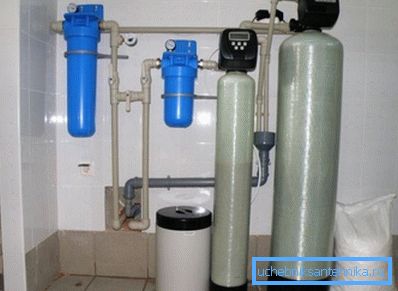
At the same time, for some reason, they forget that there are enough different impurities in the depths, and water is still considered one of the best solvents. So you need to understand, it begins to quickly absorb all around.
A specialist working with underground sources, in particular, with artesian wells or wells dug with his own hands, will say that their water contains a sufficient set of all kinds of impurities. Moreover, it is not ordinary hard water, it has inclusions of hydrogen sulfide, manganese, iron and a wide variety of bacteria.
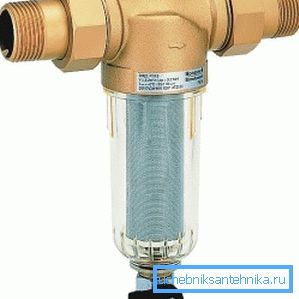
In this case, the only way to achieve a qualitative result of the analysis of the fluid is to clean it. In this way, it will be possible to remove not only excessive rigidity, but also other inclusions affecting its chemical composition.
Tip: after assessing the quality of water, create a water treatment system, including a variety of filters.
The main criteria for water treatment are the type of well and its depth. For example, the lower the aquifer passes, the cleaner it can be, but some substance may be skewed.
In this case, the mechanical components will be less used in the cleaning system, but, for example, the iron remover will use much more power. To date, manufacturers also offer a sufficient number of filter softeners.
Tip: before you make a choice, you should find out the level of hardness of the water.
Types of filters
To choose a water filtration system and to eliminate impurities today is not a problem, enterprises are ready to offer various options at different prices. But, it's not the quantity, but the quality of the products offered.
The effectiveness of each system has its limitations, so they have a different functional component, some cope better with tasks, others worse. For what they are intended, and how to use them will tell the instructions for each installation and filter.
How to deal with iron in water
The main problem of artesian wells is iron dissolved in water. The liquid looks crystal clear because of this, it is not possible to recognize it visually. But after contact with oxygen dissolved in the air, iron begins to oxidize, quickly reducing the purity of the water.
Eliminate these impurities in different ways, but most of the basis is the conversion of bivalent iron to the trivalent form. In this case, apply filters with a special oxidizing coating.
When water passes through them, the iron takes on a different form and does not pass through the pores of the coating. In addition to manganese dioxide, today used MZhF, as well as other substances.
Each filter system and water purification filters for wells have drawbacks.
Usually this:
- the inability to fully carry out the oxidation of impurities;
- the need to use stronger oxidizing agents;
- gradual clogging of filtration surfaces;
- filtering surfaces must also be cleaned and restored.
Recovery may not always be harmless to our health.
Cleaning systems
- Ion exchange installation is a slightly different filtering option.. The processes with iron are identical to the processes with hard salts. When water enters the cleaning cartridge, which is filled with resin, replacement of iron ions with sodium ions occurs.
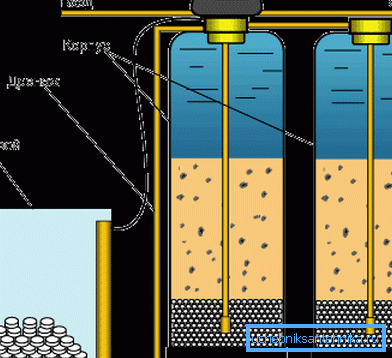
However, there is another problem associated with the possibility of oxidation of iron accumulated in the resin. Very often, the resin because of this is simply impossible to recover.
As a result, the life of such filters is sharply reduced. It should not be forgotten that their starting price is quite high and amounts to tens of thousands of rubles.
- The reverse osmosis system also makes it possible to solve the problem of iron impurities.. The osmotic unit is considered the best filter softener, although the elimination of stiffness is not its priority, so it perfectly eliminates many impurities and bacteria.

During the process, water is passed through a membrane filter consisting of millions of tiny holes. It passes the membrane very slowly, which allows you to leave all the impurities on it.
Then the pressure in the apparatus is increased, and water is pushed back out behind the membrane. Such equipment is capable of removing impurities of high concentration of iron, almost 25 mg / l. No other filters or auxiliary reagents are required.
Water purification includes the removal of excess hydrogen sulfide. It is formed by special bacteria, in which the main product of vital activity is sulfite.
Since hydrogen sulfide is a poison, it is impossible to use water containing it. Osmotic installation will help to cope in this case. The cost of such filters is an order of magnitude lower than ion-exchange installations.
- UV sterilizer - The most common way to combat bacteriological contamination of water from a well. In the equipment, radiation parameters are selected so that complete sterilization can be carried out.
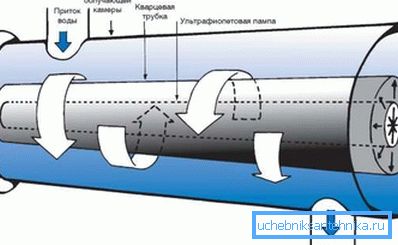
Special lamps are used as sterilizers, which are installed in robust cases. Water flows through them and is exposed to ultraviolet irradiation. The main disadvantage of the filter is its cost.
Mechanical cleaning
Many people know about this cleaning method. But, is it effective in lowering water hardness?
You should know that one device is not able to complete the task. It will take another two or three mechanical filters.
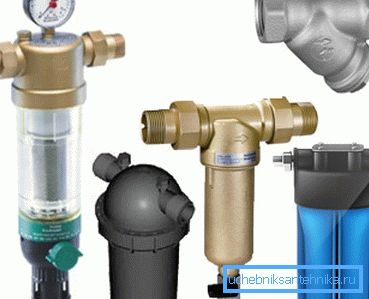
Tip: Do not forget about nitrates, as well as pesticides that enter the well water from the fields. This liquid is strictly prohibited to drink.
For example, only a concentration of 10 mg causes oxygen starvation. Therefore it is necessary to use devices for micro-and ultrafiltration.
The next type of impurities, which is successfully eliminated by mechanical systems of water purification - a set of organic materials that are of natural nature. For example, humic impurities that make water brown and degrading its taste.
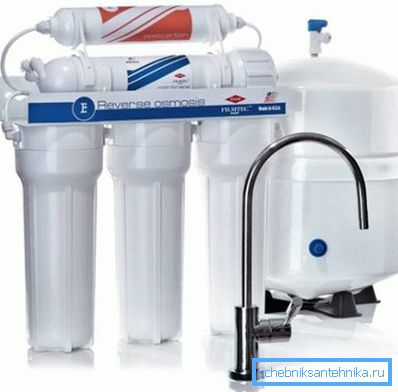
Organic and nitrates are eliminated with activated carbon. But at the same time such a filter is quickly clogged. Eliminate the "break through" molecules by ultrafiltration, because the membrane is designed to pass only water atoms.
Conclusion
From the above, it became clear that the most universal filter for well water is reverse osmosis, which can eliminate several types of impurities. At the same time, he is not able to remove uncharged particles, because he comes to the aid of carbon filters.
In the presented video in this article you will find additional information on this topic.